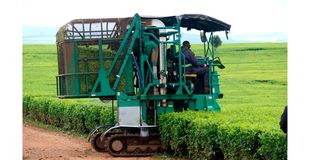Farmers eye radical tea sector reforms at Kericho conference

Workers use a tea plucking machine at the Unilever Tea farm in Kericho on June 30, 2022. KTDA chairman David Ichoho is cited as stating that there were former managers who were against the ongoing tea reforms.
The push for a review of the Tea Act 2020 to allow for direct export of made tea, and change of the model used to elect directors of the Kenya Tea Development Agency (KTDA) are some of the reforms proposed ahead of a two-day conference in Kericho County.
Establishing a second tea auction has also been floated, but the suggestion has split opinion among players in the industry.
Deputy President Rigathi Gachagua will chair the conference on tea reforms at the Kericho Golf Club starting tomorrow. The conference seeks to firm up and consolidate the views of stakeholders on reforms encompassing production, processing, marketing, sales and governance.
“It is incredibly incomprehensible that despite the product, the price, the quality, the glory of the Kenyan Tea at the global market, the smallholder tea farmer has not reaped the tea dividend to the maximum,” Mr Gachagua said ahead of the conference.
He added: “The government seeks to examine and fundamentally address the bottlenecks that make the smallholder farmer remain poor despite their product competing favourably at the global market.”
Politicians from the South Rift region have been pushing for the creation of a parallel tea auction centre in Kericho to rival the one in Mombasa as they claim that despite producing over 60 per cent of tea in the country, small-scale farmers were poorly paid.
The Mombasa tea auction is a regional trading platform for Kenya, Rwanda, Tanzania, Malawi, Uganda, Mozambique, Burundi, Madagascar, the Democratic Republic of Congo, Ethiopia and Mozambique.
The auction is riddled with brokers accused over the years of exploiting small-scale tea growers.
“The reforms as specified in the Tea Act, 2020 were well intended, but in retrospect, there is a lot that was cosmetic and sought to destabilise the brokerage arm in the market chain and enable a new lot to come on board,” Kericho Governor Erick Mutai said. He said establishing a tea auction in Kericho would see area farmers earn more.
KTDA chairman David Ichoho and vice chairman Wesley Koech said the agency was doing all it could to ensure that farmers are paid better for their produce.
“We are looking at innovations we can adopt and best management practices that have for the last two years been continuously implemented to ensure that tea farmers in the country earn higher profits from their investments,” Mr Ichoho said. He explained that the push to create a tea auction in Kericho was ill-advised as it would deprive farmers the ability to bargain with high volumes of made tea through KTDA.
Small-scale growers in Bomet, Kericho, Kisii, Nyamira, Nakuru and Nandi counties have also expressed concern over the allegedly skewed manner in which made tea from Eastern region has been marketed as the best by KTDA. They say that blind tasting has shown that tea from West of Rift are the best.
The one-man-one-vote model in the election of KTDA directors in the reforms spearheaded by former Agriculture Cabinet Secretary Peter Munya has also come under scrutiny.
“The use of one-man-one-vote in the election of KTDA directors has disadvantaged large-scale tea growers and runs the risk of having on board officials who are not keen on the reforms due to the stake they hold. We should revert to the shareholding model,” said Mr Erick Langat, a former chairman of Kapkoros tea factory.





